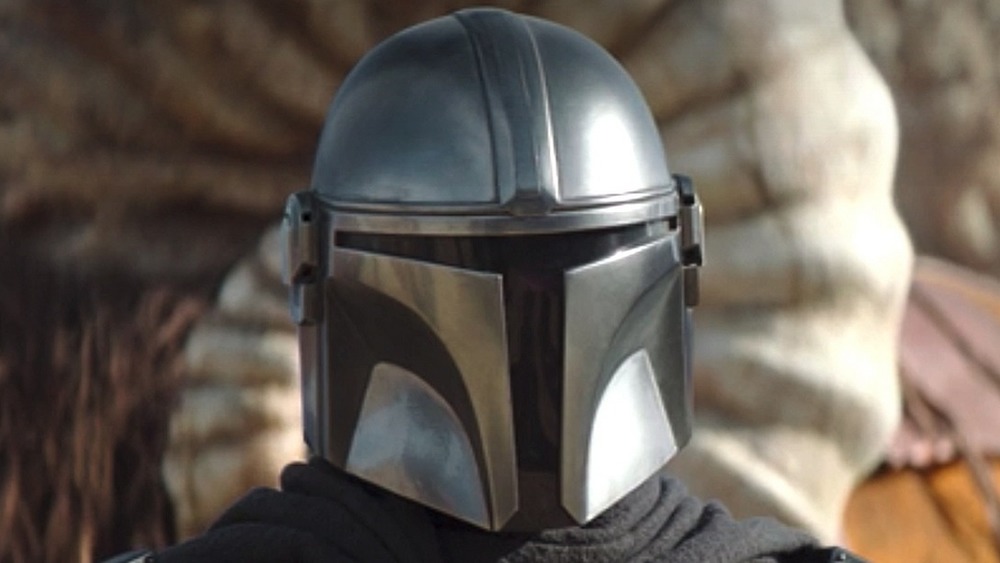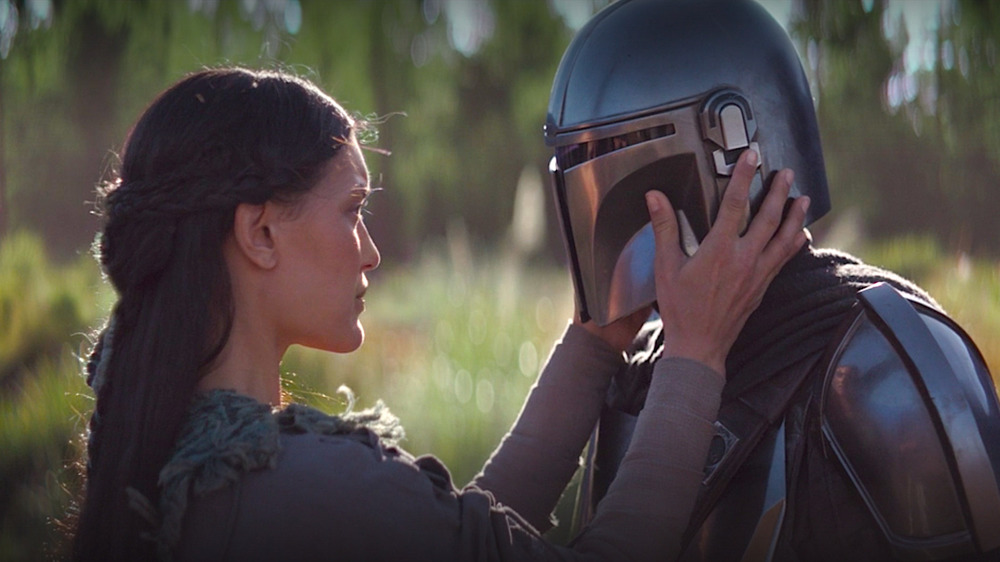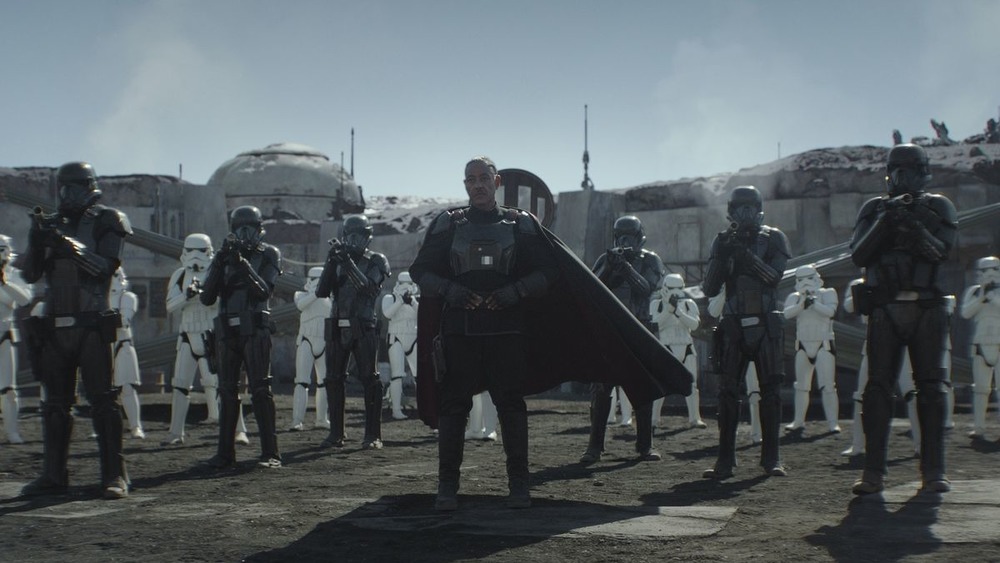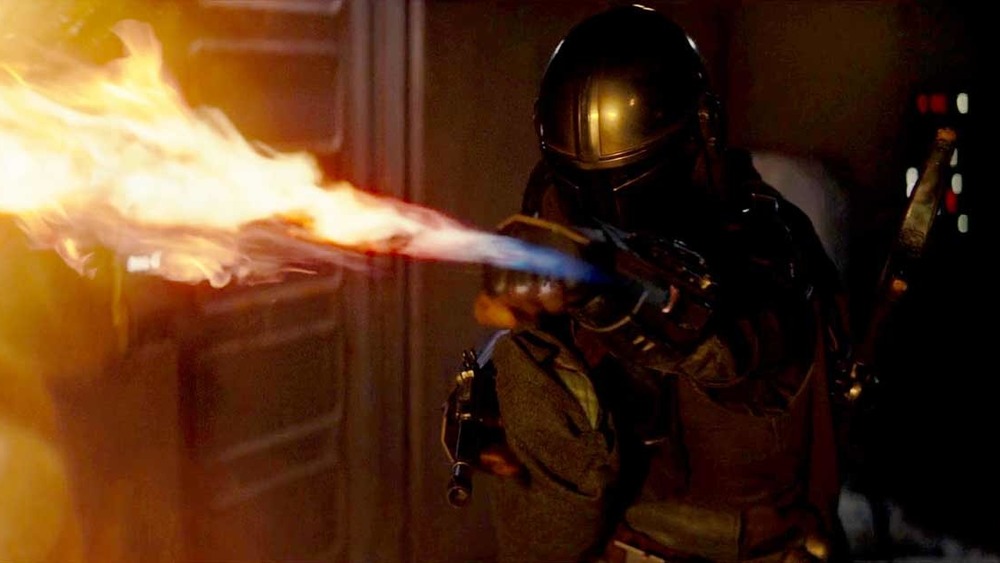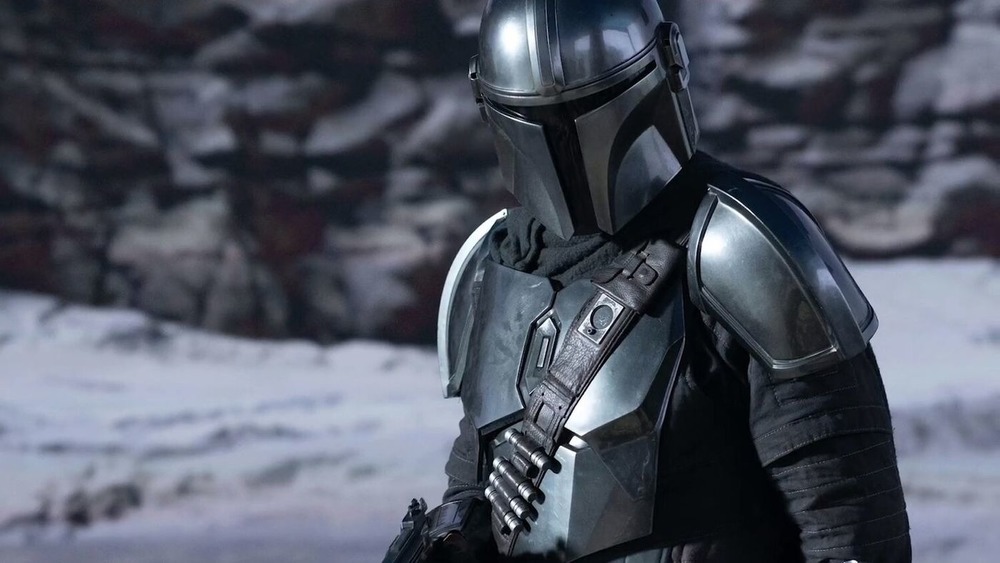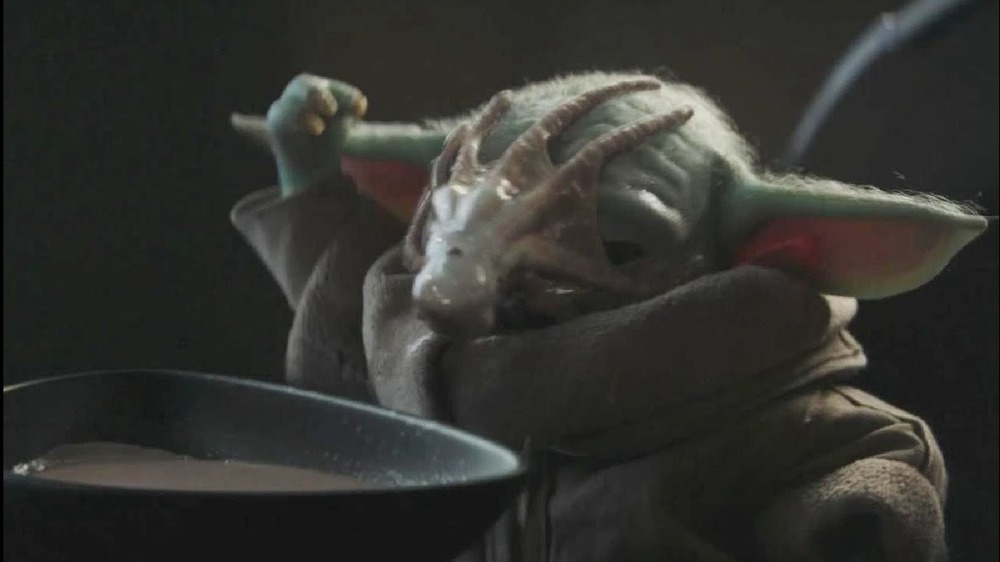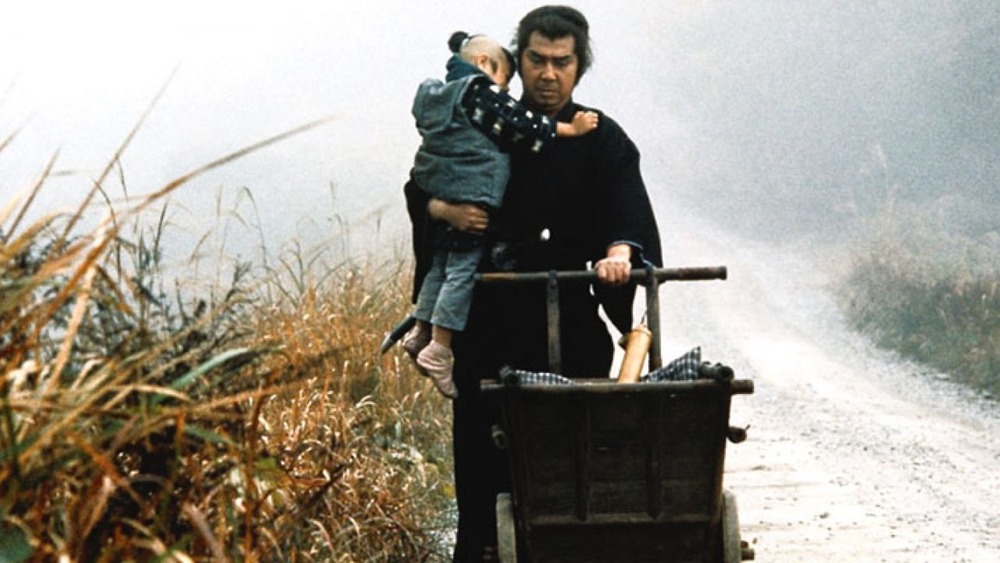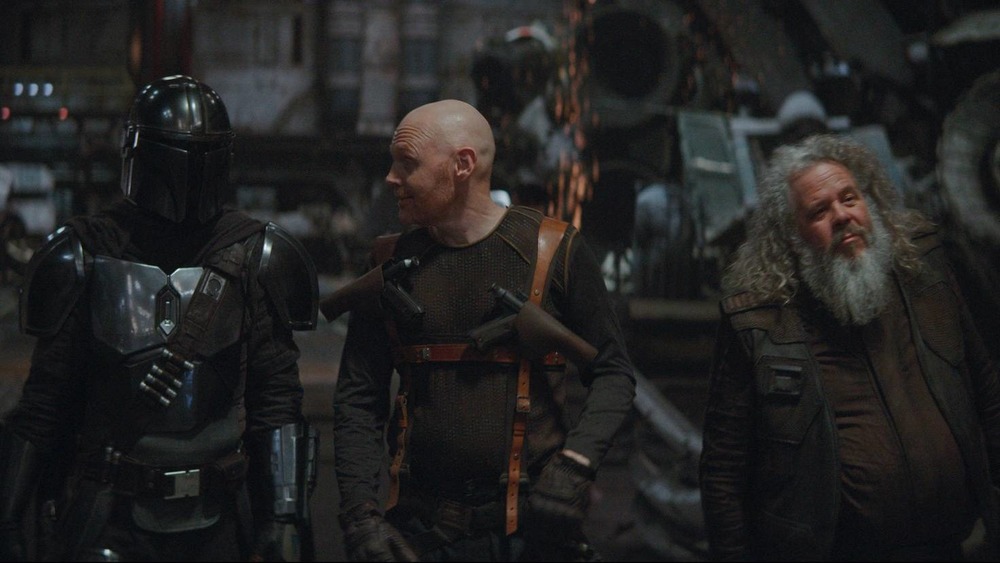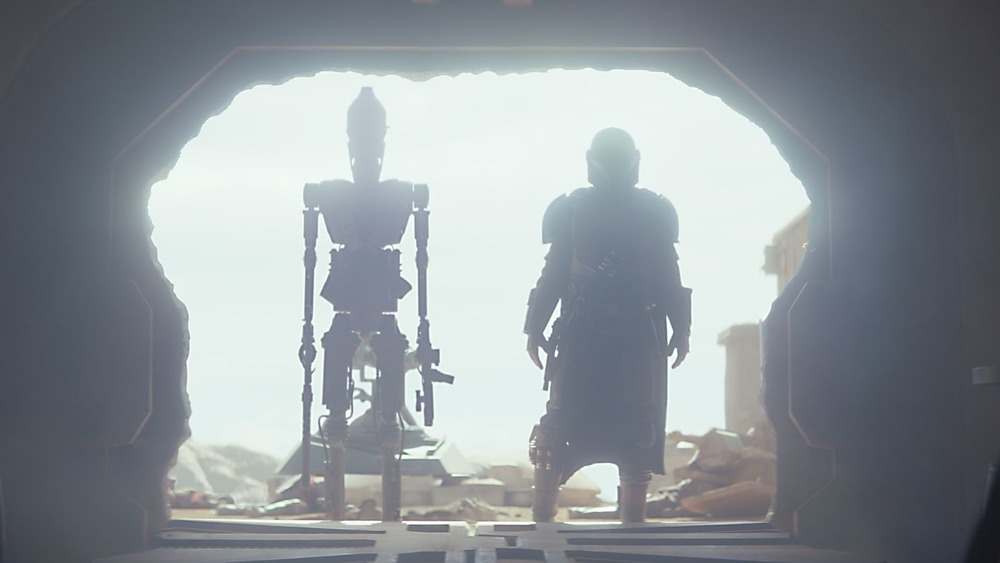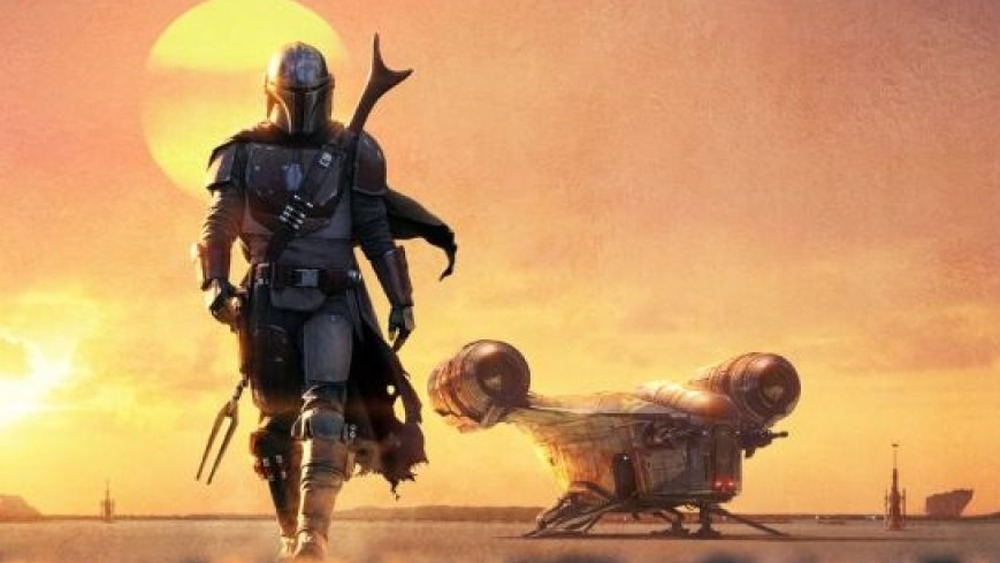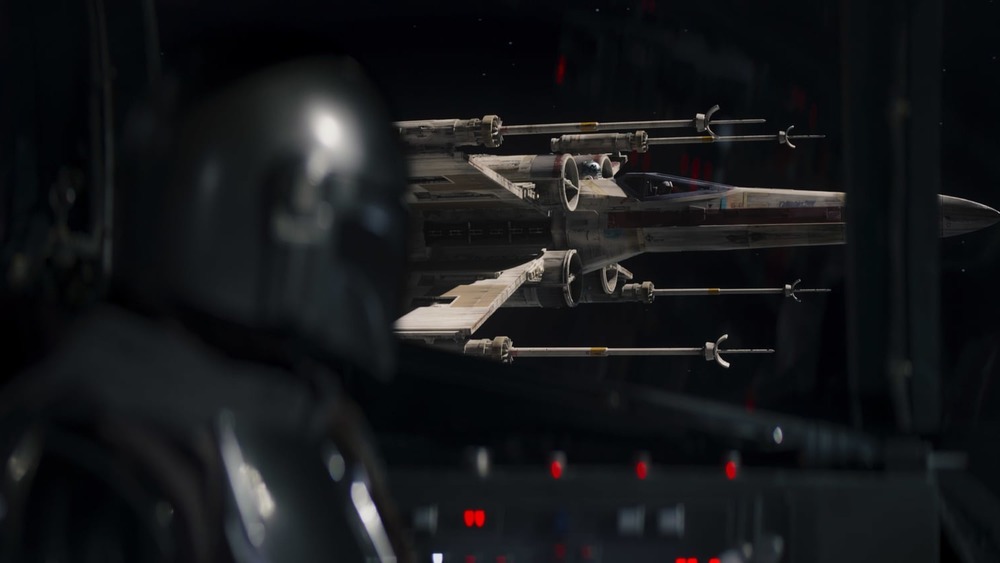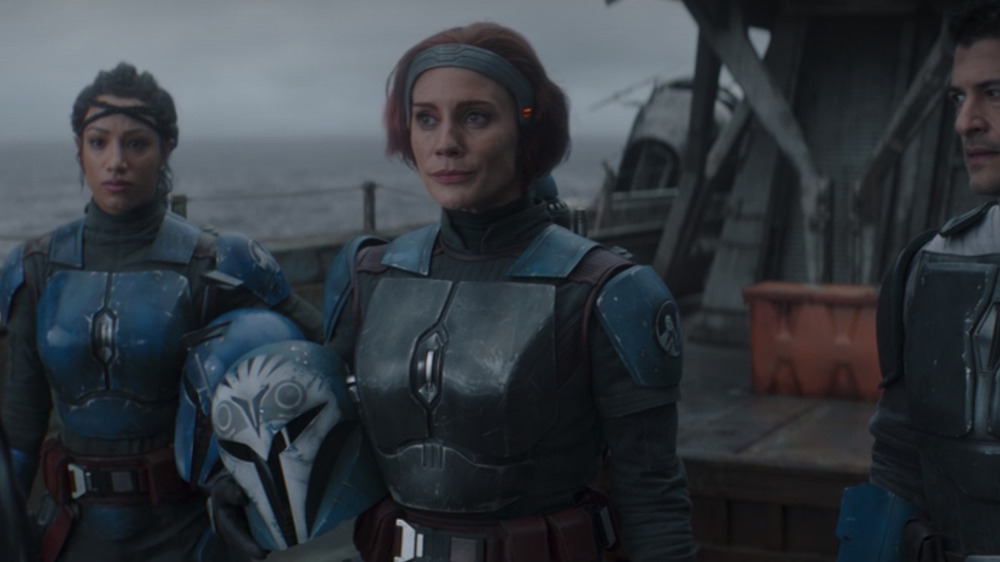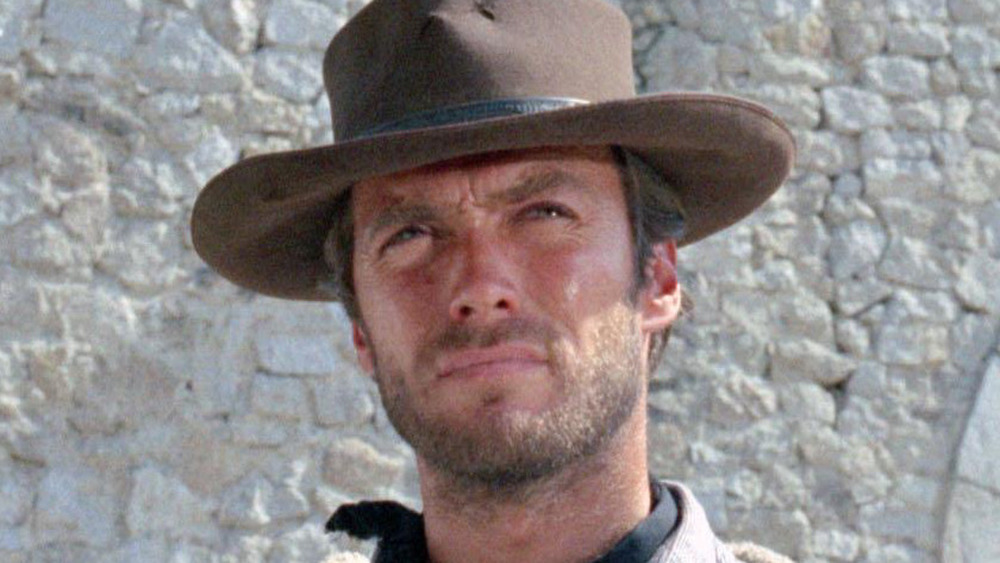Rules The Mandalorian Has To Follow
When Din Djarin became a Mandalorian, he left behind the frailties of his former life. He became more than human through intense training and a religious adherence to his code, a code passed down to him by the Tribe. Equal parts western movie and samurai story, The Mandalorian is another installment in the Star Wars timeline that follows Din, a.k.a. Mando, as he gunslings his way across the galaxy picking up jobs and protecting Grogu, the Child.
While there are many memorable characters in the Star Wars universe, none are as stoic and dispassionate as Mando. He holds firmly to a set of rules that dictate how he talks, how he acts, how he connects with the world. These rules are unbreakable and unwavering — except when it comes to Grogu. To the rest of the world Din Djarin is as steely as the armor he can never take off. But where Grogu's concerned, he becomes more human, which makes him all the more fascinating. His duty to the foundling, a mission bestowed upon him by his order, seems to be the one thing that will make him break the rules.
As the Mandalorian Tribe says, "This is the Way."
He only breaks the Tribe's helmet rule for Grogu
One of the rules Mando explicitly repeats is that no living creature can see his face without his helmet; the punishment for breaking this rule, he says, is that he can no longer put the helmet back on. He tells IG-11 not to remove his helmet even though that's the only way to save his life. Djarin finally relents when IG-11 points out that a droid doesn't count as a living being so technically there is no violation.
It's brought up throughout the series as one of Mando's most unbreakable rules, one discussed by everybody from farm village widow Omera to Migs Mayfeld. Yet when the only way he can save Grogu requires him to put on another helmet, he does so. He eventually takes off even that helmet to access an Imperial computer, standing unmasked in front of anybody who wishes to look, including Mayfeld.
As Grogu goes to leave with Luke Skywalker at the end of season 2, Din takes off his helmet so Grogu can see his face just once (oddly similar to what Darth Vader does with Luke). And he does this in a room full of Mandalorians, mercs and a Jedi Knight. Almost without a second thought he breaks one of his most precious rules.
Din never backs down
Din doesn't necessarily rush into battle, preferring when possible to be more strategic, such as when he returns to Nevarro and enlists Cara Dune and Kuiil to join him before he goes to meet Greef Karga. But he doesn't let tough odds back him down. Who could forget his shootout with Moff Gideon and a swarm of troopers? Whether it's fighting a mudhorn, or a krayt dragon; taking on the other bounty hunters on Nevarro single-handed (since he didn't know the other Mandalorians would come to his aid), or taking on a few transports full of stormtroopers to protect Grogu, Din is never afraid.
Or maybe he is afraid. But he never shows that fear, or lets it overwhelm him and make him quit. During most of the fights in The Mandalorian, Din Djarin is outnumbered; in some cases he's greatly outnumbered. He's won every battle in the series, though some just barely. But one thing he won't do is go back on his word just because of bad odds. Din Djarin will accomplish his goal or die trying.
Mando loves his flamethrower
In a world of lasers, thermal detonators, and lightsabers, Din Djarin really seems to love his flamethrower. It's certainly the most fun weapon he uses, emitting dragon's breath from a gauntlet to take out a whole group of enemies. Or more often, it buys time. Because, again, given the weapons in this universe, fire is rather primitive.
Din Djarin uses his flamethrower in almost every episode. Sometimes it works, like when he incinerates a group of stormtroopers. Sometimes it kinda works, like when he fends off a group of bounty hunters before it runs out of juice. And sometimes it absolutely fails, such as when he tries to burn the Devaronian Burg in episode 6 and the giant red monster shrugs it off. Is the flamethrower as effective as almost any of his other weapons? Not really. But he sure does seem to like it. And unlike the CGI laser blasts and whistling birds, these great leaping flames are real blasts fired by stuntmen.
He never raises his voice
It should be noted that it's hard to get a perfect read on Din Djarin's voice since it comes through the helmet. That said, what we do hear never climbs higher than his standard even-keeled tone. At times he speeds it up to show urgency but never does he start screaming, even in the middle of a desperate firefight. Never does he lose his head, regardless whether Greef Karga, Cara Dune, and everybody else on his side is screaming.
Keeping a level head is key to what The Mandalorian does. Entering impossible situations while teetering outside every established power structure leads to countless situations where the slightest loss of nerve can lead to death. When people start screaming, confusion ensues and the chaos wins.
Also, when you're bluffing, or trying to intimidate someone, or a couple of someones, you need to present a calm front to let them know you're in charge. That intimidation factor goes from body language to position...to the fact that Din Djarin never raises his voice.
Mandalorians don't eat or drink
As mentioned previously, one of Mando's central rules is that he can't be seen without his helmet in front of any other living being. For that reason, despite all the restaurants and bars he visits, Din Djarin can never eat or drink. He has his helmet on all day, and often he has his helmet on for days at a time. So he must eat and drink very little, and when he does it's just to fuel his body. He will likely never be seen holding a toast or sharing a meal with colleagues. He does share soup with Grogu while on the Razor Crest, but in public they never eat together. And while he lifts the mask to eat and drink in that episode, that wouldn't be an efficient way to consume a full meal. He certainly wouldn't eat a full squid like Grogu.
Given how hard he works all day chasing and fighting bad guys, though, Mando has to get dehydrated. Perhaps he has an in-suit hydration pack? Hungry or not, thirsty or not, Din doesn't let anybody but Grogu see him eat or drink in The Mandalorian. Not even spotchka, though he mentions it. His Spartan diet may just be part of the code. And the Spartans were some of the greatest warriors in real world history so if they did it, possibly austerity in food makes a warrior stronger.
Grounded in classic film heritage
The Mandalorian echoes Lone Wolf and Cub, a 1970s film series starring Tomisaburo Wakayama, based on a hit manga series. It's about a disgraced ronin who travels the outlands accompanied by his young son in a pram, picking up jobs that utilize his martial skills while fending off assassins sent by a top servant to the emperor. Sound familiar?
The Mandalorian also benefits from the work of director Akira Kurosawa, whose 1950s samurai films were influenced by and subsequently influenced cowboy westerns. The classic The Magnificent Seven was a westernization of Kurosawa's The Seven Samurai and the inspiration for The Mandalorian episode "Sanctuary." The original movies were about a farm town that hires samurai or cowboys to fend off a large group of raiders. In the episode, Djarin and Cara Dune defend a small farming community from Klatooinian raiders.
Yojimbo is the story of a samurai walking into a small town and playing the two sides against each other, killing almost everybody. The movie was then copied in Clint Eastwood's A Fistful of Dollars, which began the Man With No Name Trilogy. In an interview with the LA Times, Pedro Pascal, who plays Djarin, named Kurosawa and Eastwood's character as direct influences. There are also references to films like The Wild Bunch, Indiana Jones and the Last Crusade, The Searchers, and even Rogue One. Pascal also mentions Han Solo as an influence. Almost every one of Mando's traits or scenarios is grounded in classic films.
He's trustworthy but not trusting
When Din Djarin is told by the Armorer that Grogu is a foundling that he must now return to its people, Din accepts it as his lifelong mission. When he's hired by an old acquaintance named Ran to join a breakout in the episode "The Prisoner," Din keeps his teammates at somewhat of a distance, in part because he knows he can't fully trust them. Even after they double cross him, he completes his mission, bringing Qin back to the ship while he locks the rest up. Djarin, seeing another double cross, leaves a New Republic homing beacon on Qin, departing just before Ran is about to send a gunship to shoot Djarin down, resulting in an X-wing strike on Ran, Qin and their ship.
He suspects Greef is about to double cross him on his final return to Nevarro in season 1, which is why he rounds up Kuiil and Dune. Throughout The Mandalorian, Din rarely trusts anybody implicitly. Given all his experience, Djarin has seen how many people are loyal only to money and themselves, even old "friends."
Mando dislikes droids
In a flashback, we see young Din Djarin as his hometown is destroyed by battle droids. He watches everybody he knows and loves mowed down by the machines, and just as he's about to be killed by one, he's saved by a Mandalorian. For that reason he doesn't trust droids. Later on he fights IG-11, briefly allies with it, then terminates it to keep it from killing Grogu.
When he lands on Tatooine and needs to get the Razor Crest repaired, he tells Peli Motto he doesn't want her droids working on his ship. When he meets IG-11 again later on, reprogrammed by Kuiil, Din insists it's only going to kill them. But at the end, when IG-11 has rescued them all and finally sacrifices itself to allow them to escape, Din is sad at the machine's demise, which at best seems to make him lighten up a little.
Since Din with his armor and measured actions seems almost robotic, his dislike of robots seems ironic. But given that he saw his people wiped out and the fact that he can't intimidate or negotiate with a robot, that slight difference between man and machine is enough.
He's an eternal loner
In "Sanctuary," Cara Dune tells Din, half tongue-in-cheek, that he should just settle down with the nice farm widow and live a quiet life. But instead, realizing that such a life isn't for him, Din and Grogu continue on, just the two of them. Din Djarin never takes on a fulltime partner. He has allies and friends but not a partner. And that seems to be another part of the code passed down by the Tribe, one of self-reliance, though it pays to know a couple of people who have your back.
Throughout The Mandalorian, Din doesn't even give an inkling that he wants anything more substantial than allies. Even the idea that he has "friends" would have to be a term read loosely. Din doesn't seem to be the kind of guy to indulge in celebration, or even socialization, without some mission in mind. That's what makes his relationship with and affection for Grogu even more remarkable. But now that Grogu is gone, you shouldn't expect Din to invite anybody else to share his ship on a long-term basis.
No formal allegiance
Mando is a bounty hunter, and at times a mercenary, and both of those jobs require a man who has no formal allegiance to any government or counter-government. As The Mandalorian starts, Din Djarin does a job for an unknown client. He figures out the client is Imperial and fulfills the job — almost. He goes back and rescues Grogu, but not because of his justifiable dislike of the Empire; he does it because of his bond with Grogu.
Later, in chapter 10, "The Passenger," Din comes under attack from a pair of X-wings because the Razor Crest isn't yet registered with the New Republic. They lead him to crash on an ice planet, although they then rescue him from spider creatures in an ice cave. The explanation? According to Carson Teva, while the Razor Crest was involved in the Bothan-5 security break (in the episode "The Prisoner"), security camera show Mando putting three wanted criminals behind bars, to save himself and try to keep them from killing Lt. Davan. Teva and the other pilot, Trapper Wolf, still leave him in an ice cave with a broken ship because his status is still questionable.
So Din isn't a member of the Republic or the Empire. If he ever had one allegiance, it was to the Tribe.
Faithful to the Tribe, not Mandalore
You might think that Din Djarin, also called Mandalorian, nickname Mando, star of The Mandalorian, is from the planet Mandalore. So when it's revealed that he was rescued by the Mandalorians from a battle-ravaged town on a planet that — it's implied — wasn't Mandalore, you might be confused. "Mandalorian isn't a race. It's a creed," Cara Dune explains to Greef Karga on episode 8, "Redemption." That's both true and not true. There are Mandalorians. But Din Djarin was taken in by a sect of Mandalorians known as the Tribe.
We discover the difference when he meets Bo-Katan and her small group of Mandalorians. They can take off their helmets, and they explain that he's holding on to the belief of the Children of the Watch, a cult from Mandalore. He still holds to those beliefs after meeting Bo-Katan and her crew, including his duty to find foundling Grogu's "people," the Jedi — though he does take off his helmet in plain view of living people, in violation of the code, for the sake of Grogu.
And while he doesn't hold allegiance to the planet Mandalore, since he took the Darksaber from Moff Gideon, technically Din Djarin is the ruler of Mandalore.
A man of few words
When Pedro Pascal was preparing to play Din Djarin for The Mandalorian, Jon Favreau suggested he watch Kurosawa movies and Clint Eastwood's Man With No Name classics, among others. Whether it's Kurosawa's heroes or Eastwood's nameless drifter, the protagonist says very little. It goes back to the old John Wayne saying, "Talk low, talk slow and don't say too much."
Mando doesn't make many jokes, and the ones he does make are gallows humor at best. For example, when he takes off with Grogu and Frog Lady in a damaged ship, he jokes that the door might get sucked off the damaged ship, in which case they'll all be dead.
Mando doesn't ask how the family's doing. He says the minimum amount of words, usually in a very even tone, to get the mission done. Except, again, with Grogu, the eternal exception. With Grogu he shows a softer side, even seems to have conversations, though they're often one-sided. These interactions feel almost light. It's like Grogu brings out the human side in the steely soldier.
Because when Din Djarin is the Mandalorian on a mission, he's all business.
